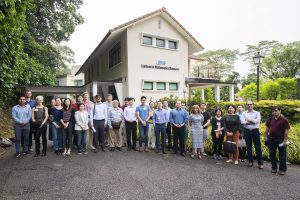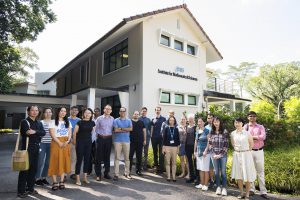Organizing Committee
Co-chairs
- Bibhas Chakraborty (National University of Singapore)
- Ying Kuen Cheung (Columbia University in the City of New York)
- Eric Laber (North Carolina State University)
- Jialiang Li (National University of Singapore)
- Susan A. Murphy (Harvard University)
- Ambuj Tewari (University of Michigan)
Contact Information
General Enquiries: ims(AT)nus.edu.sg
Scientific Aspects Enquiries: bibhas.chakraborty(AT)duke-nus.edu.sg
Overview
Personalized or precision medicine is a cutting-edge topic in today’s biomedical research landscape, and statisticians, computer scientists and other mathematical scientists are increasingly getting interested in this topic. Precision medicine is focused on making treatment decisions for every individual patient based on his/her clinical, genetic, and other characteristics. At the interface of statistics and computer science, precision medicine is operationalized by what are known as treatment regimes; these are data-driven decision rules that are mappings from the space of patient characteristics to the space of possible treatments. In the special case of time-varying settings (e.g., management of chronic health conditions), these rules are often called dynamic treatment regimes.
Broadly speaking, mobile health (mHealth) interventions are defined as medical and public health interventions delivered via mobile devices like smartphones, tablet computers or wearable devices. Mobile health is a relatively new area in health sciences, and offers exciting opportunities in terms of improving access to care, engagement and delivery, patient communication, real-time treatment monitoring, adherence support and health outcomes, in addition to potential cost reduction. Specifically, mHealth is very promising in efficient management of chronic diseases in a personalized fashion, in which case most mHealth interventions become special instances of dynamic treatment regimes, albeit with some special considerations. In the era of “big data”, technological advances have enormously increased the volume, quality and accessibility of patient-level data in the mHealth setting, and thus it offers a great opportunity for statisticians, computer scientists and other data scientists to grab. In Singapore, with the government’s “smart nation” initiative, mHealth is a potentially impactful area at a greater societal level.
The program will focus on the theme of quantitative methods for developing personalized mHealth interventions, and bring together perspectives from statisticians, computer scientists, as well as health scientists working in the area of mHealth. The goal will be to provide a platform for intellectual exchange between statisticians, computer scientists and quantitatively oriented public health/clinical/health services researchers on the theme of mHealth, so that they all can learn from each other about the cutting-edge study designs and analysis techniques in mHealth, as well as practical lessons from real studies. Interactions between these diverse groups can trigger valuable collaborations, and ultimately some good innovations. The primary application area of focus will be management of chronic diseases like diabetes, and thus will be of potential interest to medical and public health professionals based in Singapore.
The workshop will consist of presentations by leading quantitative experts in the area of mHealth, primarily statisticians and computer scientists, but also by some health scientists. It will have two parts, each lasting for a week. The first part will focus on design considerations in the context of mHealth intervention studies. The second part, on the other hand, will be devoted to analysis methods for data arising from mHealth studies. A one-week tutorial on basics of personalized medicine, treatment regimes, reinforcement learning and causal inference will precede the main workshop. The tutorial will be targeted towards statistics graduate students and professionals interested in personalized medicine and mobile health.
Activities
- Tutorial on Personalized Medicine, Treatment Regimes, Reinforcement Learning, and Causal Inference: 11–15 February 2019
- Workshop on Design of mHealth Intervention Studies: 18–22 February 2019
- Workshop on Analysis of Data from mHealth Intervention Studies: 25 February–1 March 2019
- IMS Distinguished Visitor Lecture Series
- Public Lecture: 21 February 2019, 6:30pm–7:30pm
Mobile Health Intervention Optimization
Susan A. Murphy, Harvard University, USA
Venue: Lecture Theatre 31, NUS, Block S16, Level 3, 6 Science Drive 2, Singapore 117546
Please note that our office will be closed on the following public holiday.
– 5 and 6 Feb 2019, Chinese New Year.
Venue:
- IMS Auditorium
- Block S16, #06-118, Seminar Room, Department of Statistics and Applied Probability, NUS, 6 Science Drive 2, Singapore 117546 (27 Feb 2019 Afternoon)


